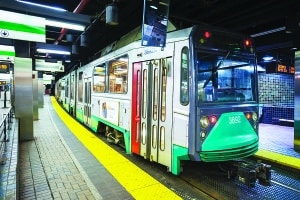Frustrated with a recent series of announcements, Boston-area employers are growing impatient with the MBTA and demanding that it consider “bolder solutions,” including farming out capital spending oversight to a new entity.
Greater Boston Chamber of Commerce President James Rooney, on behalf of the group’s more than 1,300 business members, in a letter to the MBTA Fiscal and Management Control Board Monday said the T’s recent decision to delay some capital spending is “most concerning” and will result in the system’s users continuing to “endure unreliable service.”
Chamber members are also concerned about possible delays in receiving new Orange Line cars, the likelihood that the T will not meet its deadline for train safety upgrades and delays in implementing the transit authority’s automated fare system.
“In its December 2018 annual report, the FMCB stated that 2019 is expected ‘to be a turning point during which customers see results,'” Rooney wrote. “Now, less than six months after that report, the MBTA has announced a series of delays that threaten to stall progress, alter the long-term vision of the MBTA’s own strategic plan and leave customers with a system that falls desperately short of their needs.”
Asking residents for more patients and to endure delays “should not be an option,” Rooney said.
“With several news stories in recent weeks announcing major MBTA project delays and a project execution crisis, the FMCB today faces a crucial decision,” he wrote. “You can accept the status quo performance that continues to result in both service and capital project delays, a failing regional transportation system and the worst congestion in the nation. Or, you can aggressively demand improvements and ensure the promises of a world class public transportation system.”
Rooney wrote that businesses want the T to revisit its capital spending plans over the next 30 days and said the T should consider “whether the capital project delivery function belongs within the T organization” and whether it’s necessary to “create a professional capital infrastructure projects organization similar to the School Building Authority.”
Separately, an assessment unveiled Monday using new data about inventory and conditions that the MBTA was required to collect over the past year, put the system’s total modernization and replacement price tag at $10.1 billion.
MBTA officials said during a briefing that they do not believe the new estimate provides an “apples-to-apples” comparison with the authority’s previous figure of $7.3 billion and that the increase comes from different metrics rather than from changes to the system over the past four years.
The new figure is “fundamentally different,” General Manager Steve Poftak said, because the data – which the MBTA had been required to collect following a Federal Transit Authority rule change – relied on different inventory counts and condition ratings than the past report.
Samantha Silverberg, the MBTA’s senior director for capital planning, described the new estimate as a “fundamental reset” in how the authority thinks about its long-term needs. She and Poftak pointed to existing investments, saying the capital needs could have been significantly higher if not for about $3 billion in spending in recent years.
Officials also said the estimate does not include projects that are currently scheduled or underway. If every modernization project in the current five-year capital investment plan – including station reconstructions and purchase of new buses – is completed on time, the needs assessment would drop to about $6.1 billion.
The new framework will help MBTA officials better plan for how to meet the identified needs across the system, Poftak said, describing the new estimates as “more apparent” but not “daunting.”







